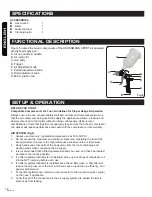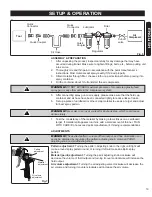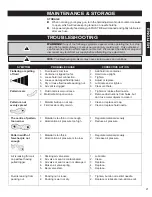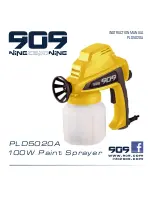
PNT152-B
ENGLISH
16
GENERAL SAFETY INSTRUCTIONS
Disconnect the tool from the air source before making any adjustments, changing
accessories, or storing the tool. Such preventive safety measures reduce the risk
of starting the tool accidentally.
Store idle tools out of reach of children and other untrained persons. Tools are
dangerous in the hands of untrained users.
Maintain tools with care. Do not use a damaged tool. Tag damaged tools “Do not
use” until repaired.
Check for misalignment or binding of moving parts, breakage of parts, and any
other condition that may affect the tool’s operation. If damaged, have the tool
serviced before using. Many accidents are caused by poorly maintained tools.
Use only accessories that are recommended by the manufacturer for your model.
Accessories that may be suitable for one tool may become hazardous when used
on another tool.
SERVICE
Tool service must be performed only by qualified repair personnel.
When servicing a tool, use only identical replacement parts. Use only authorized
parts.
Use only the lubricants supplied with the tool and specified by the manufacturer.
AIR SUPPLY AND CONNECTIONS
The air supply connection must not hold pressure when air supply is disconnected.
If an incorrect fitting is used, the tool can remain charged with air after
disconnecting and thus will be able to work even after the air line is disconnected,
possibly causing injury.
Do not use any type of reactive gases, including, but not limited to, oxygen and
combustible gases, as a air source. Use filtered, lubricated, regulated compressed
air only. Use of a reactive gas instead of compressed air may cause the tool to
explode, which will cause death or serious personal injury.
Use only a pressure-regulated compressed air source to limit the air pressure
supplied to the tool. The regulated pressure must not exceed 100 PSI. If the
regulator fails, the pressure delivered to the tool must not exceed 150 PSI. The
tool could explode which will cause death or serious personal injury.
Always disconnect air supply from tool:
a) before making adjustments.
b) when servicing the tool.
c) when clearing a jam.
d) when tool is not in use.
e) when moving to a different work area, as accidental actuation may occur,
causing injury.







































